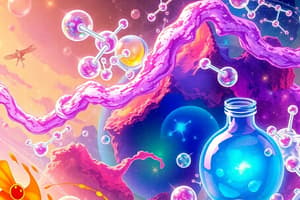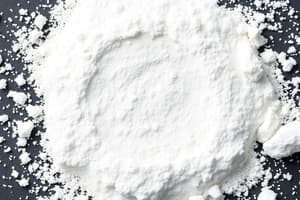Podcast
Questions and Answers
What distinguishes an element from a compound?
What distinguishes an element from a compound?
An element is a pure substance that cannot be broken down into simpler substances, while a compound consists of two or more elements that can be chemically broken down.
Define the main characteristics of pure substances.
Define the main characteristics of pure substances.
Pure substances have a definite composition and consistent properties throughout their structure.
What are the two categories of mixtures, and how do they differ?
What are the two categories of mixtures, and how do they differ?
Mixtures are categorized into homogeneous mixtures, which have a uniform composition, and heterogeneous mixtures, which have non-uniform compositions.
List three examples of physical properties of matter.
List three examples of physical properties of matter.
What is the difference between physical properties and chemical properties of matter?
What is the difference between physical properties and chemical properties of matter?
Explain what a heterogeneous mixture is.
Explain what a heterogeneous mixture is.
How can compounds be broken down into their constituent elements?
How can compounds be broken down into their constituent elements?
Provide an example of a homogeneous mixture.
Provide an example of a homogeneous mixture.
What happens to the composition of ice when it melts?
What happens to the composition of ice when it melts?
How can ice revert back to its solid state?
How can ice revert back to its solid state?
What distinguishes chemical properties from physical properties?
What distinguishes chemical properties from physical properties?
Give an example of a chemical change.
Give an example of a chemical change.
What are intensive properties and how do they differ from extensive properties?
What are intensive properties and how do they differ from extensive properties?
List two examples of intensive properties of matter.
List two examples of intensive properties of matter.
What is an example of a chemical property related to metals?
What is an example of a chemical property related to metals?
Explain the difference between an element and a compound.
Explain the difference between an element and a compound.
What distinguishes a pure substance from a mixture?
What distinguishes a pure substance from a mixture?
Give an example of a pure substance and explain its properties.
Give an example of a pure substance and explain its properties.
How do physical properties of matter differ from chemical properties?
How do physical properties of matter differ from chemical properties?
What are the two main categories of matter?
What are the two main categories of matter?
Define an element and a compound, and provide an example of each.
Define an element and a compound, and provide an example of each.
What is a characteristic of mixtures that distinguishes them from pure substances?
What is a characteristic of mixtures that distinguishes them from pure substances?
Describe the significance of physical chemistry in understanding matter.
Describe the significance of physical chemistry in understanding matter.
How does the classification of matter into pure substances and mixtures aid in chemical studies?
How does the classification of matter into pure substances and mixtures aid in chemical studies?
Flashcards are hidden until you start studying
Study Notes
Matter Overview
- Matter is defined as anything that occupies space and has mass, encompassing both visible and invisible entities (e.g., water, air).
- Divided into two main categories: Pure Substances and Mixtures.
Pure Substances
- Composed of a definite composition and specific properties.
- Further divided into:
- Elements: Cannot be broken down into simpler substances.
- Compounds: Combination of two or more elements, can be separated back into elements through chemical reactions.
Mixtures
- Combinations of two or more substances that retain their individual properties.
- Further classified into:
- Heterogeneous Mixtures: Non-uniform composition (e.g., salad).
- Homogeneous Mixtures (Solutions): Uniform composition throughout (e.g., saltwater).
Physical Properties
- Can be measured and observed without altering the substance's identity.
- Examples include:
- Color
- Melting point
- Temperature
- Boiling point
Chemical Properties
- Only observable during a chemical change.
- Examples include:
- Flammability
- Reactivity
- Toxicity
- Ability to rust
Physical vs. Chemical Changes
- Physical changes do not alter the composition (e.g., melting ice).
- Chemical changes result in alterations to the substance's chemical makeup (e.g., cooking an egg).
Intensive and Extensive Properties
- Intensive Properties: Independent of the amount of matter present (e.g., temperature, boiling point, pressure, color).
- Extensive Properties: Dependent on the amount of matter (not specified in the text).
Branches of Chemistry
- Inorganic Chemistry: Focuses on inorganic compounds, including metals and minerals.
- Organic Chemistry: Studies carbon-based compounds, encompassing a vast range of substances in the environment.
- Physical Chemistry: Investigates the physical principles governing chemical interactions and molecular behavior.
Studying That Suits You
Use AI to generate personalized quizzes and flashcards to suit your learning preferences.




